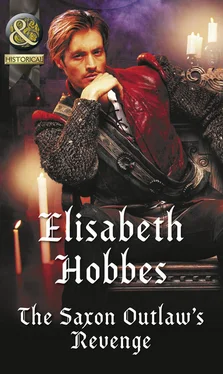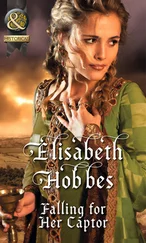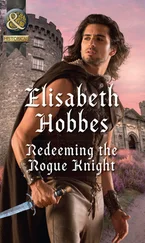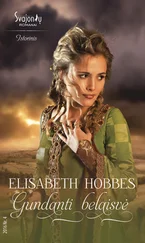At the mercy of her enemy!
Abducted by Saxon outlaws, Constance Arnaud comes face-to-face with Aelric, a Saxon boy she once loved. He’s now her enemy, but Constance must reach out to this rebel and persuade him to save her life as she once saved his...
Aelric is determined to seek vengeance on the Normans who destroyed his family. Believing Constance deserted him, he can never trust her again. Yet, as they are thrown together and their longing for each other reignites, will Aelric discover that love is stronger than revenge?
‘We loved each other once, didn’t we?’ she asked in a whisper.
‘Did we? What did we know about love?’ The corner of his mouth twitched. ‘We were barely more than children, just waking up to what our bodies sought.’
It had been love to her, and to hear him dismiss it as nothing more than the lust all men felt cracked her heart. She swallowed down her grief and continued with her plan.
‘What does your heart want now?’ Constance whispered. ‘What does your body want?’
She reached a hand to his chest, spreading her fingers wide. She felt his intake of breath, saw the pulse at his throat quicken. His hand sought her waist, tugging her closer until they were face to face. He bared his teeth in a grimace that might have been passion or hatred.
‘I want you,’ he growled. ‘But this will not end well. It can’t.’
His voice had an edge to it she had not heard before, but which spoke of danger. She knew then that she had him.
Author Note
After the Norman Conquest of England in 1066 there was a period of rebellion that lasted until 1069. This resulted in William’s retribution, known as the Harrying of the North. Men escaped across the borders into Scotland or Wales, returning to fight their oppressors and carry out raids. Additionally, many of the barons appointed by William saw the uncertain times as an opportunity to increase their own land and status.
Dispossessed Saxons who refused to submit to their oppressors took refuge in the forests of England. They became known as ‘silvatici’ or ‘wildmen’. Among the most well-known were Hereward the Wake and Eadric the Wild, both of whom eventually reached peace with their new rulers and were pardoned. It is these men and others like them who are my basis for Aelric.
This story takes place in Cheshire. Hamestan is the name given in the Domesday Book to the Hundred that covers the area where I now live. Readers wishing to investigate the locations that inspired me should search for Alderley Edge, Mow Cop, Lud’s Church and The Roaches. Thanks go to my husband and children for accompanying me on frequent muddy walks.
As always, each of my books has a song. This time it was ‘It’s All Coming Back to Me Now’. The best version, in my opinion, is by Pandora’s Box.
The Saxon Outlaw’s Revenge
Elisabeth Hobbes

www.millsandboon.co.uk
ELISABETH HOBBES grew up in York, where she spent most of her teenage years wandering around the city looking for a handsome Roman or Viking to sweep her off her feet. Elisabeth’s hobbies include skiing, Arabic dance and fencing—none of which has made it into a story yet. When she isn’t writing she spends her time reading, and is a pro at cooking while holding a book! Elisabeth lives in Cheshire with her husband, two children and three cats with ridiculous names.
Books by Elisabeth Hobbes
Mills & Boon Historical Romance
Falling for Her Captor
A Wager for the Widow
The Blacksmith’s Wife
The Saxon Outlaw’s Revenge
Visit the Author Profile page at millsandboon.co.uk.
To Laura and Tim,
for endless speculation about what was in the box.
Contents
Cover
Back Cover Text
Introduction
Author Note
Title Page
About the Author
Dedication
Chapter One
Chapter Two
Chapter Three
Chapter Four
Chapter Five
Chapter Six
Chapter Seven
Chapter Eight
Chapter Nine
Chapter Ten
Chapter Eleven
Chapter Twelve
Chapter Thirteen
Chapter Fourteen
Chapter Fifteen
Chapter Sixteen
Chapter Seventeen
Chapter Eighteen
Chapter Nineteen
Chapter Twenty
Extract
Copyright
Chapter One
Cheshire—1068
They hanged the rebels in the market square. Rain hung in the air. Heavy drizzle that characterised this part of England: thicker than mist and turning the world grey and damp.
A cheerless day for a brutal act.
Constance Arnaud wished she could leave this cold, unwelcoming country and return to Normandy where the sun was visible some days even in October. She wiggled her twisted foot to rid herself of the dull ache that ran from her toes to knee and pulled her fur-trimmed cloak tighter. She tipped the hood forward. The folds of heavy wool would not block out the sounds, but she would not have to watch the men die.
The old thegn stood between two guards, his fine tunic torn and filthy with blood and grime. He wore fetters but was bowed down by more than the weight of the chains that held him.
‘Brunwulf, formerly Thegn of Hamestan, for conspiring to incite revolt, your remaining land and title is forfeit. As tenant-in-chief for my liege and King, it is my duty and right to pass this sentence on you.’
From the dais Baron Robert de Coudray’s voice rang clear across the square. A muttering of anger rippled around the crowd, dying away quickly as the soldiers raised their weapons.
Constance wondered how many of the serfs and villeins that huddled behind makeshift railings understood what her brother-in-law had said. She had lived in England for eighteen months, but a year after moving from Winchester to Cheshire the accent still seemed thick and impenetrable to her ears.
‘Your life and the lives of those who raised swords against your King are also forfeit,’ Robert continued.
Brunwulf raised his head at this and stared at Robert. His eyes were bruised and almost forced shut with the swelling, but the hatred in them was clear. He spat a reply, the name and sentiment familiar to Constance.
‘The Bastard of Normandy is no King of mine.’
Another murmur, this time of approval, sped round the gathered people and a few cries of agreement rose up. Constance shifted nervously. People must have come from half of Cheshire to witness today’s executions and, though these were farmers and craftsmen, serfs and women, there were a lot more of them than there were soldiers in the baron’s retinue.
Robert’s cheeks reddened as he bellowed his reply. ‘The crown has been William’s for two years. We rule England now. If you had submitted you could have retained control of your lands as our vassals, but you refused to see sense. Now you will pay the penalty.’
A cruel light shone in the baron’s eyes. ‘You will be the last to die. You will watch the deaths of your countrymen and sons first though, so you understand how utterly you have failed. Let this be a warning to any who think to oppose us.’
Robert jerked a thumb and a dozen bound men were brought forward from the heavily guarded cart and pushed to their knees alongside the thegn. They bore the same signs of rough treatment as Brunwulf and like him wore clothes that once spoke of quality. These were not serfs or slaves, but thegns and housecarls themselves.
Three at a time the condemned men were dragged up the steps to the scaffold in the centre of the square and nooses tightened around their necks. As the first three executions were carried out wails of sorrow broke out among the crowd. The voices of wives and mothers, sisters or lovers. The soldiers standing in front of the huddled, grieving women crossed their pikes to hold them back in case the women rushed forward in attack. Constance could not help the sigh that escaped her.
Читать дальше













